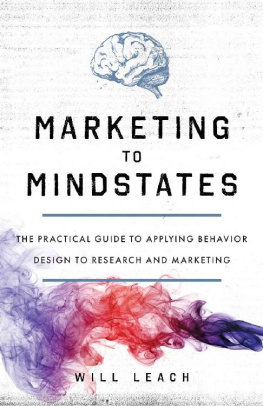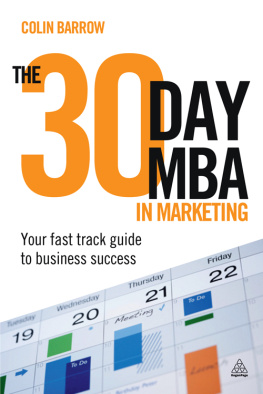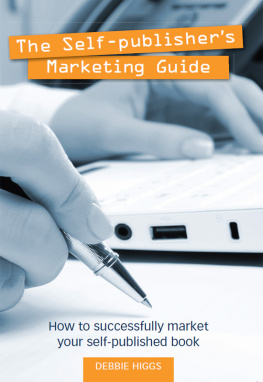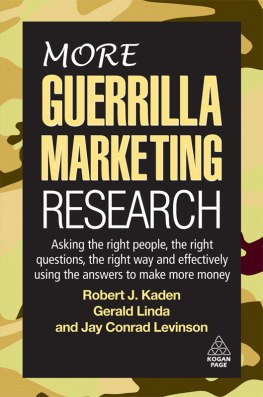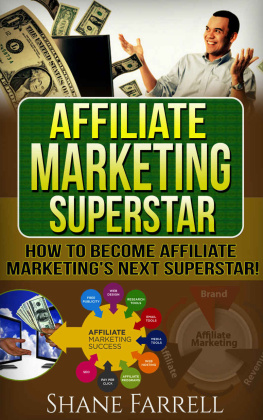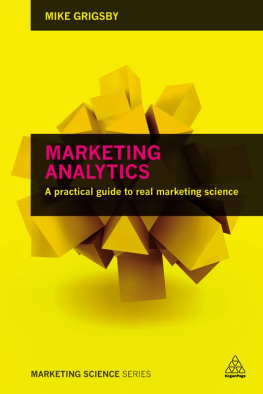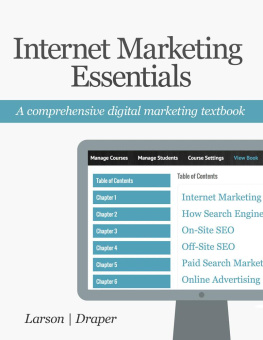All rights reserved.
For those who dont want to earn a PhD in Psychology while reading, this book is for you.
Introduction
It was the morning of June 9, 2009 in Frisco, Texas, when I made the most shocking realization of my professional life. Almost everything Id learned over my entire consumer marketing career up to that point was simply wrong .
And not just a little wrong, either. I was grossly mistaken about everything . Heres the scary part: you and likely every marketer you know are not actually sure why some of your messaging works and why some of it doesnt. As an industry, we are shooting in the dark because we dont understand how to message to peoples nonconscious minds.
I dont say this to shame youin fact, just the opposite! I say this to inspire you. You can be more intentional with your marketing by applying the principles of behavioral science, which will result in much more consistent success in your messaging. And Ill show you how in this book.
But back to that June morning.
How can I pinpoint the date of my realization so precisely? Easythats the morning my wife, Melanie, gave birth to our beautiful baby boy.
One of the first important decisions Melanie and I had to make when we found out she was pregnant was which day care to choose for Nicholas. The amount of anxiety you feel when another parent asks you where youll send your child is excruciating. You always feel like its a setupa way for other parents to rank you by how much you love your soon - to - be child. Because of these societal pressures, you will spend literally months trying to find the perfect day care (and, as you may know, getting the day care right is no laughing matter when your wife is seven months pregnant and nesting).
Now, Im what I refer to as a pros - versus - cons junkie, which played a huge role in selecting a day care. Ever since I was a little kid, Ive loved collecting data and comparing everything. Ive been this way my entire life, so theres no point fighting it nowits just a matter of working with it.
In fact, it was my own childhood that turned me on to this method of decision making. My fifth - grade teacher, Ms. Peeler, once said that if it was done right, a pros - and - cons list would make all of my choices fast and easy. It struck me as magicin order to make the best decision possible, all I had to do was list out every pro and con I could think of for the different options, place them on separate sides of a list, and calculate which side had the most points.
And I love this method. Ive used a highly organized comparison of pros and cons to help me make the most important decisions in my life. Should I join the army? What college should I go to? Should I stay with my girlfriend (sorry, Bess)? Should I take this job?
Pros and cons are my oracle, and I am a devoted disciple.
When it was time to find the perfect day care for our new son, Nicholas, I once again turned to my rational, structured approach. Four months before Nicholas was born, Melanie and I started seriously scoping out local day care centers. We asked friends at work and in the area for recommendations and started narrowing candidates.
After wed visited our top seven, I created my exhaustive list of pros and cons to select three finalists. From there, we planned to meet with each of the finalists for a final round of interviews and evaluations, choose the one with the most pros, and get placed on their waiting list for the coming year. Easy, right?
When Nicholas actually entered the world, my foolproof, logical plan went right out the window.
Heres what happened on that June 9 morning: Melanie gave birth prematurely with a chorus of nurses, doctors, Aunt Shirley, and beeping bedside equipment welcoming Nicholas into our lives. This should have been the happiest moment of my life, but Im telling you right now that I was an absolute wreck, both emotionally and physically. I knew deep down that I wasnt prepared to take home a baby in a few days.
When we first drove to the hospital, we were expecting only a short precautionary tripa pat on the back, a nice fat bill, and a drive home to go on with our lives. But thats not how life works. I was supposed to have another five weeks to prepare our house and my mind for our son. Hell, I hadnt even installed the car seat yet.
Melanie could see the desperation in my eyes, even several hours after shed given birth. She told me to go home, pick up a few hours of sleep, and come back with the baby bag wed prepared at the house (but didnt bring to the hospital the night before).
I was off to complete my first dad task as a new father. Big pressure.
I dont remember much about my walk to the parking lotit was all a blur. I was a brand - new father, and I could only feel the rush of pure joy, love, and frankly, inadequacy that comes with having your first baby. I was low on sleep and even lower on ideas of how to be a responsible, loving dad. With that heavy weight on my shoulders, and a strong desire to start off my new role right, I left the hospital.
And thats when I saw it.
On my way out of the parking lot, just as I pulled onto the street, I noticed the sign for one of our finalist day care centersCarpe Diem. I knew I was tasked with another dutygo home and get some sleepbut I pulled into their property on adrenaline and instinct.
When I walked in, the look on the receptionists face said it all. She had seen new fathers in my mindstate hundreds of times before. I barely had to open my mouth to tell her my storyall about our premature son, my wife having no idea she was about to give birth, the rush of doctors and nurses in the delivery roombefore she put her hand up to quiet me.
She smiled and said, You dont have to go any further. I get it. Were nearly full, but we have exactly one spot left. Its yours if you want it.
Right there, in a moment of panicked excitement without my wife, I signed up on the spot. I made the spontaneous decision without so much as a second thought, let alone a full - on pros - and - cons list. It was incredibly uncharacteristic of me, especially for such an important decision. My temporary emotions took over and I acted on them.
I acted spontaneously. And you know something? It felt good. Really good. I didnt need a list to tell me the right thing to do, and I didnt need a reason or permission to do it. I just felt intuitively that I was behaving in the best interests of my newborn son, even though I didnt use my logical mind to make the decision.
It worked out fine in the end. Carpe Diem took great care of Nicholas. But still, how could this happen? How could I possibly ignore four months of painstaking comparisons and randomly choose one finalist to take care of our son? I can rationalize it after the fact as the act of a loving fatherand that is part of the explanationbut how do you explain why any of us go against our best - laid plans and act on pure instinct and emotion?
Why do we act contrary to plans, or against logic in general?
Why do we buy things and services that we know we dont need?
Why do we make the same bad choices again and again, even when we know well feel worse in the long run?
And most importantly for you, how can marketers tap into this behavioral phenomenon to deliver messaging and experiences that consumers truly want?
These are simple questions, but it turns out that the answers arent simple at all. Dont get me wrong, I felt great about my decision to get Nicholas into Carpe Diem, but the troubling part is that it wasnt fully my decision.

